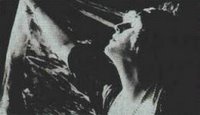
This frenchified film was made before the excellent “J’Accuse!”, recently commented upon by this German Count in his modern diary; it is another great example of the use and innovation of film grammar and cinematographic technique by Herr Gance. This oeuvre is full of suggestions, allegories and flashbacks that improve the film in a prodigious way.
“La Dixième Symphonie” is the story of the obscure past and an uncertain future that is the lot of the heroine of the film. She is married to a composer, an admirer of the German Herr Beethoven’s musical compositions (a token of his good taste, certainly). This composer misunderstands a tragic event in his wife's past, an event which comes back to torment all of them when the composer's daughter gets engaged. The knowledge the composer gains of his wife's sad experience becomes the inspiration for his new musical work. This makes the film an interesting meditation about art as catharsis and the thought that every artistic creation springs from the creator’s special experiences. These real life episodes may be reflected in different artistic shows as music, literature or even non-stop Teutonic operas.
A special score was composed for the film in order to emphasize the story. Besides the score, Herr Gance use evocative shots of a dancer dancing in romantic landscapes while the composer struggles to make art out of his marital sufferings, another example of the originality and newness of Herr Gance film technique.“La Dixième Symphonie” is the confirmation of the French film director’s creative genius, making him an unquestionable pioneer in film history.
And now, if you'll allow me, I must temporarily take my leave because this German Count must attend a musical soirée in which will be performed a musical score created by a countryman of this Teutonic aristocrat, Herr Ludwig van ( not Von like this German Count ) Beethoven’s Ninth symphony ( not Tenth per that frenchified film director ).
Herr Graf Ferdinand Von Galitzien
-/-
Este filme afrancesado realizado antes de la excelente “J’Accuse!” y recientemente comentado por éste Conde germánico en su diario moderno, es otra magnífica muestra del uso e innovación de la técnica y el lenguaje cinematográfica por parte de Herr Gance, una obra repleta de sugerencias, alegorías y flashbacks que enriquecen el filme de forma prodigiosa.
“La Dixième Symphonie” es la historia del pasado oscuro y el futuro incierto que sufre una de sus protagonistas, casada ésta con un compositor admirador éste de la obra del germano Herr Beethoven ( lo que demuestra su buen gusto, ciertamente , ) compositor que al sospechar o malinterpretar el episodio trágico que sufrió su esposa en el pasado y que ahora vuelve a atormentarla además de intentar formar parte de la familia casándose con la hija del compositor, le servirá como inspiración para su nueva obra musical, resultando finalmente el filme ser una interesantísima reflexión sobre el arte como catarsis, la idea de que toda creación artística surge de vivencias especiales por parte de sus creadores que se ven reflejadas finalmente en esas diferentes manifestaciones artísticas sea música, literatura o incluso interminables óperas teutonas.
Se compuso para el filme en su día, una partitura especial para enfatizar así la historia, además de igualmente ilustrar Herr Gance el filme, además de la banda sonora, con sugerentes escenas de una danzarina bailando en paisajes románticos mientras el autor está interpretando esa obra surgida del dolor marital, otro ejemplo más de la originalidad y novedad de las propuestas cinematográficas de Herr Gance, siendo “La Dixième Symphonie” la constatación del genio creativo del director francés, un indiscutible pionero cinematográfico y gran referente para la historia del cine.
Y ahora si me lo permiten les tengo que dejar momentáneamente, pues este Conde germánico tiene que asistir a una “soirée” musical en la cual será interpretada la novena sinfonía ( que no la décima cómo pretende ese director afrancesado ) del compatriota de éste Conde, Herr Ludwig van ( que no Von como éste Conde germánico ) Beethoven.
Herr Graf Ferdinand Von Galitzien

Keine Kommentare:
Kommentar veröffentlichen